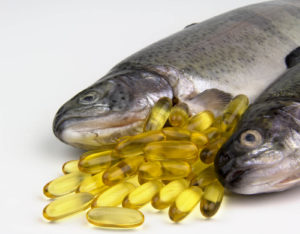
Omega Fatty Acids and Eye Health
Omega fatty acids are all the rage in the health sphere. They are known to help with joint health, hair, skin, and nails, and even brain function. But what about your eyes? Just how do Omega fatty acids benefit your eye health?
As we’ve discussed before, there is such a thing as good fat, and one perfect example is omega fatty acids. These are also known as omega-3 and they’re amazing! They do so much to keep your whole body functioning properly. So, we’re going to talk about even more benefits they have to offer. Incorporating more omega-3 into your diet can do wonders for your overall health.
What Is Omega-3?
Omega-3 fatty acids are essentially important dietary fats. They support many of your bodily functions and systems. For example, your immune system, reproductive system, nervous system, and cardiovascular system. As for your eyes, there are two really important forms of omega-3: docosahexaenoic acid (DHA) and eicosapentaenoic acid (EPA). Both fatty acids support your retinas and the progression of your vision over time.
DHA is found in high concentrations in the retina. So, we know it is very important to the growth and development of this area. This is especially true for developing fetuses, but omega-3 is important to anyone of any age. According to recent studies, they can significantly help improve overall vision.
Where Can I Get Omega-3 and How Much Do I Need?
If you don’t eat a lot of fish, then you probably are not getting enough DHA and EPA. The recommended daily intake for both fatty acids combined is one-half to one gram. DHA and EPA are most easily found in certain types of fish such as salmon, tuna, mackerel, anchovy, and trout. If you are a vegetarian, however, you can purchase omega-3 that has been processed from algae.
 Eating fish around two to three times a week should give you a good dose of omega fatty acids. You can also take fish oil supplements if you don’t like the taste of fish. However you choose to get it, omega-3 is very important to your eye health. Getting enough omega-3 has been shown to prevent retinal diseases, so make sure you are getting the recommended dose!
Eating fish around two to three times a week should give you a good dose of omega fatty acids. You can also take fish oil supplements if you don’t like the taste of fish. However you choose to get it, omega-3 is very important to your eye health. Getting enough omega-3 has been shown to prevent retinal diseases, so make sure you are getting the recommended dose!
Benefits of Omega-3 for Adults
The AAO suggests that omega-3 is linked to preventing dry eyes and macular degeneration in adults. These fatty acids can also help ensure the eyes drain their fluids correctly, which in turn helps to prevent conditions such as glaucoma. Omega-3 has also been linked to preventing high pressure in the eyes as well as retinopathy or deterioration of the retina.
Besides benefiting your eyes, we know omega-3 impacts the rest of the body as well. Omega-3 has been linked to the following:
- Fight anxiety and depression
- Improve fetal brain development
- Reduce ADHD symptoms in kids
- Decrease inflammation
- Decrease the risk of developing Alzheimer’s
Additionally, omega-3 can help prevent some cancers and decrease fat in your liver. No matter your age, your body depends on fatty acids to survive. If you have children, it’s crucial that they also get their daily dose. Not only will it aid in their eye development and health, but it can reduce asthma. For your senior parents, omega-3 will help with bone and joint pain. For your teen girls, consider omega-3 for treating menstrual cramps. The thing about omega-3 is that it can help with a lot of issues in the body, and there really are not any adverse effects to taking a proper dosage. So, talk to your healthcare provider about adding it to your supplement regimen and see how it benefits your body.
As you can see, omega-3 is important for all aspects of bodily functioning. This of course includes your eyes and vision.
Ratio of Omega-3 to Omega-6
Our bodies make all the fatty acids they need except for two: omega-3 and omega-6. Omega-6 is another type of fatty acid that is necessary for our health. It contributes to healthy brain tissue, regulates metabolism, and stimulates hair and nail growth. However, too much omega-6 will cause your blood pressure to increase. You can also develop blood clots and potentially suffer a heart attack or stroke. Although omega-6 is necessary from our diets, moderation is key.
You should have around three times more omega-3 in your system than you do omega-6. This way, you will have a higher count of DHA and EPA, giving you better vision! And, you’ll reduce your risk of a blood clot and stroke. Most people, however, have more omega-6 than omega-3.
If your omega-6 intake is higher than your omega-3 intake, you should make a few small changes. Otherwise, you will miss out on the wonderful eye benefits of omega-3!
To balance your omega-3 and omega-6, consider using healthier cooking oils and eating more fish and vegetables. Limit your intake of fried foods, limit your intake of red meat, and limit your intake of hydrogenated oils. Limiting snack foods and fried foods can help you achieve a lower omega-6 rate as well.
Omega-3 and Your Eyes
Whether you eat fish, take fish oil, or opt for a vegetarian option, make sure you are getting enough DHA and EPA. This important nutrient is critical for healthy vision and eyes. Omega-3 isn’t the only essential eye health nutrient. In fact, there are 17 eye-healthy nutrients you need to be getting daily. Be sure you are also getting all of the other 17 essential vitamins and nutrients that benefit your vision. Adding supplements to your health and wellness regimen can do a lot for your health overall.
Remember, it’s really important to combine several different techniques for protecting and restoring your vision. This ensures you are more likely to succeed. In addition to eating cleaner and taking a supplement, stay active. Be proactive about your eye health; your future eyes will thank you!
Our Rebuild Your Vision Ocu-Plus Formula Contains All 17 Vitamins, Minerals, and Herbal Supplements to Improve Your Eye Health!












Good useful article – thanks!